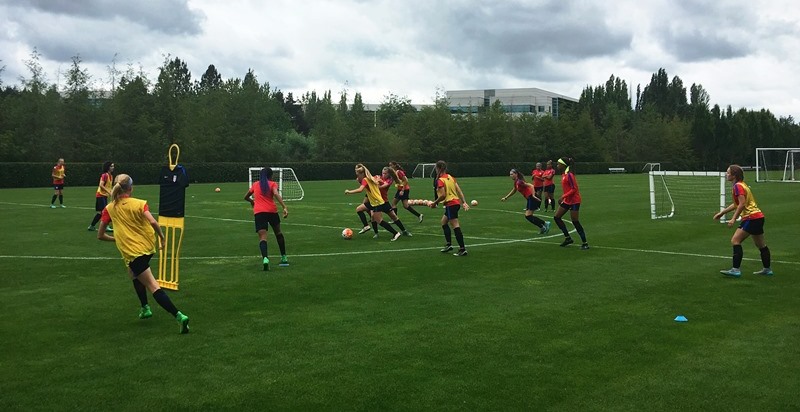Dougherty: Unlucky? No, you simply messed up.

 The young wide midfielder did well to time his run behind his defender, staying onside until the ball was played. One touch forward and he was closing in on the end line. And then came the cross … Which went five yards behind the goal.
The young wide midfielder did well to time his run behind his defender, staying onside until the ball was played. One touch forward and he was closing in on the end line. And then came the cross … Which went five yards behind the goal.
“Unlucky!” yelled his coach encouragingly as the midfielder jogged back.
As I watched the play unfold, “unlucky” wasn’t the word that crossed my mind. More like: “horrid technique.”
A bit harsh? No, not really, for luck – or lack thereof – had nothing to do with the poor cross that left his defender and the opposing goalkeeper thankful for the blunder.
A good cross doesn’t rely on luck. Neither does a good trap, a good shot, a good pass, or good defending. It requires technique.
+Dougherty: High school coaches, don’t forget to write a Thank You card
I certainly don’t criticize the coach for offering positive feedback. Indeed, youth soccer – all youth sports, really – could use a lot more of it. But at that specific time, blaming poor luck wasn’t the right thing to say.
Perhaps: “Good run, Brandon! Just remember to turn your hips in before you cross, and keep the cross in front of the goal.”
It is that type of specific, on-the-spot feedback that helps a player learn from his or her mistake. Positive, yet instructive as well. He can run back for the goal kick with the knowledge that his coach appreciated his run, but that he needs to get that final touch to the inside before hitting the cross. “Got it, coach,” he’ll likely think to himself.
There’s often a fine line between instructive criticism and unhelpful feedback. There are several variable at work: timing; the tone of the instruction; emotions of a tight game; the individual player’s self-confidence and ability to accept timely correction.
For coaches and teachers, it’s called “The Teaching Moment” – that small window of time when a coach can use recent action to make a specific coaching point. There’s a lot riding on how well the coach uses that moment. The wrong word or poor tone can deflate a young player. The right words and proper tone can help make a player better instantly.
“Unlucky” would qualify as the wrong word for the midfielder with the poor cross.
“’Bad luck,” says author and college soccer coach Gary Curneen, “is often the choice of excuses too many teams use to cover their bad decision making, lack of discipline, and poor preparation.” And he’s right.
There are certainly instances of bad luck in sport. The own goal “scored” by England goalkeeper Paul Robinson could certainly be attributed by some to bad luck. That divot couldn’t have been more perfectly placed (for Croatia, anyway).
But I could see Curneen saying, “Nonsense!” Let’s go through his three points:
- Bad decision making: English defender Gary Neville made a poor decision by making a pass that would go into the net if untouched – as turned out to be the case. I remember having it drilled into my head when I was 10 years old not to play the ball back to the goalkeeper in a way that, if he missed the ball, it would go in. And that’s exactly what happed.
- Lack of discipline: Paul Robinson made a mess with this kicking technique. It’s “safety first” when you’re clearing a ball from your own six-yard box, and the inside the foot was the technique required at that moment, not the laces. He may have shanked the ball with the inside of his foot, but it would not have tickled the netting.
- Poor preparation: Robinson didn’t make himself available wide of the goalmouth, and Neville didn’t play it wide of the goalmouth. Neither was prepared.
No, not “unlucky.” It was poor technique.
Young players can rest easy knowing that highly paid, world-class players make mistakes. Soccer is a game that requires strength, stamina, agility while making thousands of lightning fast decisions a game. Every player makes mistakes.
And to continually improve, it’s critical for players to recognize that mistakes are … well, mistakes, and not The Fates frowning upon you. If you mess up, own it, and vow to do it right the next time.
And coaches, it’s incumbent upon you to be honest with the player. Shanking a cross behind the not isn’t “unlucky.” It’s poor technique, and it’s your job to help correct it.
Good luck!
SOCCERWIRE MARKETPLACE
- The St. James FC Travel Staff Coach - North (Loudoun) & South (Fairfax)
- The St. James FC Girls Academy (GA) Head Coach - 2 teams
- The St James FC Boys Travel Tryouts
- OFFICIAL BAYERN MUNICH SUMMER CAMPS U.S.
- JOIN THE ALLIANCE!
- OFFICIAL FC BARCELONA CAMPS U.S.
- The Cup San Diego - Hosted by Legends FC
- Players Wanted - Undergraduate or Post-graduate
- Head Coach - South Region at The St. James FC
- Travel Coach - North Region at The St. James FC











